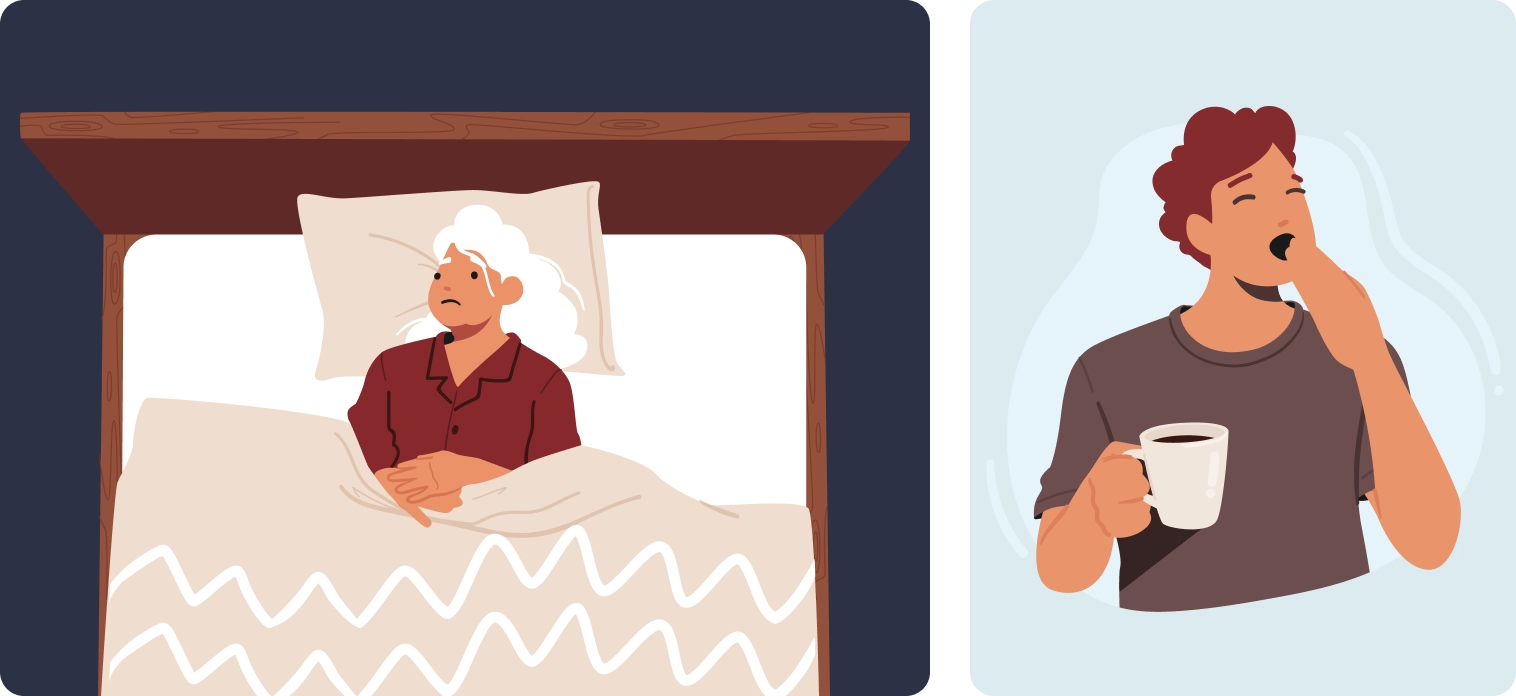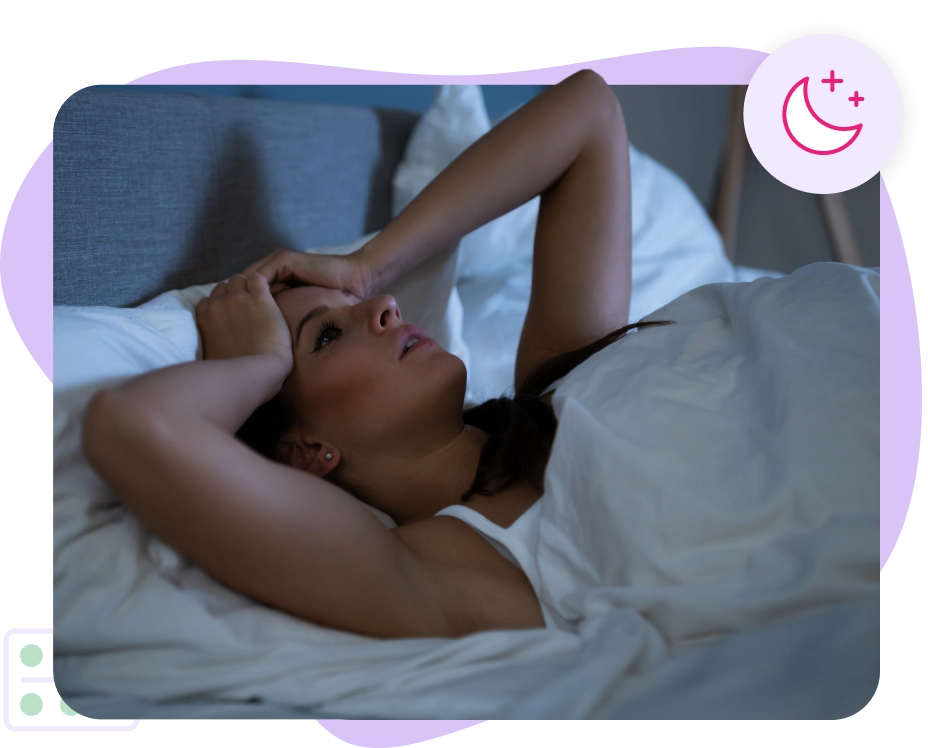About Insomnia
Insomnia is a common sleep disorder that involves persistent difficulty falling asleep or staying sleep even when you have ample time and opportunity for sleep. It can make it hard to go to sleep at the beginning of the night or to get back to sleep when you wake up too early in the morning. Long-term insomnia, lasting 3 months or more can adversely affect your mental and physical health.
Insomnia is most common if:
- You’re over 60, because you are more likely to suffer from one or more of the causes of insomnia (see below)
- You’re a woman, due to hormonal changes
- You’re under a lot of stress or have a mental health issue
- You work the night shift or have an irregular sleep schedule

Causes
Short-term insomnia, that lasts less than 3 months, is most likely caused by stress. Long-term insomnia that lasts longer than 3 months and can arise from various factors.
The most common causes of insomnia are:
- Emotional stress, worry, or anxiety
- Noise
- Irregular sleep schedules
- Excessive caffeine, nicotine, or alcohol consumption
- Eating too late in the evening
- Certain medical conditions such as chronic pain, gastrointestinal disorders, respiratory disorders, or hormonal imbalances
- Mental health conditions like depression, anxiety disorders, or post-traumatic stress disorder (PTSD). Insomnia and mental health conditions often occur together.
- Some medications, including certain antidepressants, stimulants, and corticosteroids
- Late-shift work, jet lag, or travel across time zones or activities that disturb the body’s natural sleep-wake cycle
Symptoms
Common insomnia symptoms include:
- Finding it hard to fall asleep despite feeling tired
- Waking up frequently during the night
- Lying awake at night
- Waking up too early and being unable to fall back asleep
- Feeling unrefreshed and still tired after waking up and during the day.
- Feeling cranky, irritable or depressed
- Not being able to concentrate at work or school
- Having ongoing worries about not being able to sleep
Treatment
Treatment for insomnia typically involves a combination of behavioural interventions, lifestyle modifications and in some cases, medication.
Effective insomnia treatment strategies include:
- Establishing sleep hygiene practices. Fortunately, insomnia usually gets better by changing your sleeping habits, also known as your ‘sleep hygiene’. This includes following a regular sleep schedule, creating a relaxing bedtime routine and optimizing the sleep environment—making sure your bedroom is dark, quiet, and used only for sleep.
- Identifying and addressing underlying factors. Stress, anxiety, and other medical conditions can trigger or contribute to insomnia.
- Practicing Cognitive-Behavioral Therapy for Insomnia (CBT-I). CBT-I is a structured, evidence-based therapy that targets maladaptive thoughts and behaviors related to sleep, aiming to improve sleep quality and quantity.
- Taking sleep medication for a few days. Although they are generally not recommended for long-term use due to a high risk of dependence and tolerance, your GP may prescribe sleep medications for short-term use.
Pharmacy Sleep Aids
Lifestyle modifications and behavioral interventions should be your first-line treatments for insomnia, with sleep aids used only as a short-term solution or as directed by a pharmacist or healthcare provider.
Common sleep aids include:
- Antihistamines: Certain antihistamines, such as diphenhydramine or Promethazine, are often used as sleep aids in OTC cold and flu medicines such as Nytol and Phenergan due to their sedative effects.
- Herbal Supplements: Herbal supplements like valerian root, passionflower, lavender and chamomile are frequently used to promote relaxation and improve sleep quality. These supplements are available in various formulations, including tablets, capsules, or teas.
- Melatonin: Melatonin is a hormone that regulates the sleep-wake cycle and is commonly used to alleviate jet lag or promote sleep in individuals with circadian rhythm disorders. Melatonin is only available by prescription. It comes as standard tablets, slow release tablets, capsules and a liquid that you drink.
FAQ
How do I know if I have insomnia?
If you consistently have trouble falling asleep, staying asleep or you wake up feeling unrefreshed every day, you may have insomnia. Your GP will typically diagnose insomnia by looking at your insomnia symptoms, sleep diaries, and in some cases, overnight sleep studies.
How do you fix insomnia?
The most common methods for treating insomnia include improving sleep hygiene, addressing underlying causes like stress or medical conditions and treatments such as cognitive-behavioural therapy for insomnia (CBT-I) or medication.
How long does it take for insomnia to improve?
With consistent adherence to sleep hygiene and to interventions such as cognitive-behavioral therapy for insomnia (CBT-I), you may experience significant improvements to your insomnia within 4-8 weeks. But recovery times can take several months or more depending on the individual and other contributing factors such as any underlying health conditions.
More Info
To get more information about insomnia, visit the NHS condition page.



















